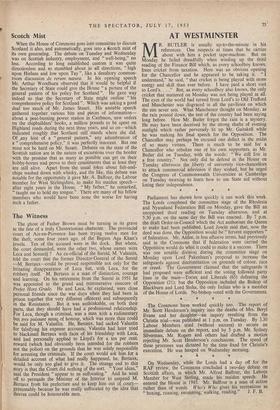When the House of Commons goes into committee to discuss
Scotland it also, and automatically, goes into a €cotch mist of its own generating. The debate on Tuesday and Wednesday was on Scottish industry, employment, and " well-being," no less. According to long established custom it was quite directionless and so stumbled about in all directions, " high upon Hielans and low upon Tay ", like a desultory common- room discussion de rerum natura. In his opening speech Mr. Arthur Woodburn observed that it would be helpful if the Sedretary of State could give the House " a picture of the general pattern of his policy for Scotland ". He gave way indeed so that the Secretary of State might outline " his comprehensive policy for Seotland ". Which was asking a good deal too much of Mr. James Stuart. His amiable speech gathered together various bits and pieces of information— about a peat-burning power station in. Caithness, new orders on the shipbuilders' books, a million pounds to be spent on Highland roads during the next three years, and so on—which indicated roughly that Scotland still stands where she did. Of ..any hint of a " general pattern," any adumbration of a " comprehensive policy," it was perfectly innocent. But one must not be hard on Mr. Stuart. Debates on the state of the Scottish nation are in the nature of excursions over the border with the promise that as many as possible can get on their hobby-horses and prove to their constituents that at leagt they are still alive. Apart from "the usual jokes about fish-and- chips washed down with whisky, and the like, this debate was notable for the opportunity it gave Mr. A. Balfour, the Labour member for West Stirlingshire, to make his maiden speech— after eight years in the House. " My father," he remarked, " taught me to hold my tongue." There are many of his fellow members who would have been none the worse for having such a father.


























 Previous page
Previous page